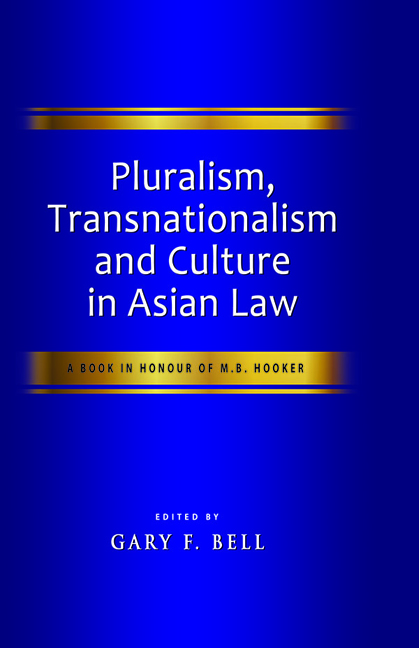Book contents
- Frontmatter
- Dedication
- Contents
- Preface
- Acknowledgements
- About the Contributors
- Chapter 1 M.B. Hooker and Southeast Asian Law: Path-breaking Passions
- Chapter 2 Asian Thought and Legal Diversity
- Chapter 3 Comparative Law, Anti-Essentialism and Intersectionality: Reflections from Southeast Asia in Search of an Elusive Balance
- Chapter 4 Legal Pluralism and Legal Anthropology: Experiences from Indonesia
- Chapter 5 Mapping the Relationship of Competing Legal Traditions in the Era of Transnationalism in Indonesia
- Chapter 6 Indonesia's Weak State Courts and Weak Law Fare Poorly in a Pluralist Commercial World
- Chapter 7 When Laws Are Not Enough: Ethics, Aesthetics, and Intra-Religious Pluralism in Contemporary Indonesia
- Chapter 8 Legal Pluralism and the Constitutional Position of East Malaysia's Indigenous Peoples: The View from the Longhouse
- Chapter 9 Sharia, State and Legal Pluralism in Indonesia: How Law Can You Go?
- Chapter 10 Negotiating Legal Pluralism in Court: Fatwa and the Crime of Blasphemy in Indonesia
- Chapter 11 Islamic Law in Israel: A Case Study in Legal Pluralism
- Chapter 12 The Road to Democracy Goes Through Religious Pluralism: The Indonesian Case and Thoughts on Post-Mubarak Egypt
Chapter 10 - Negotiating Legal Pluralism in Court: Fatwa and the Crime of Blasphemy in Indonesia
Published online by Cambridge University Press: 12 January 2018
- Frontmatter
- Dedication
- Contents
- Preface
- Acknowledgements
- About the Contributors
- Chapter 1 M.B. Hooker and Southeast Asian Law: Path-breaking Passions
- Chapter 2 Asian Thought and Legal Diversity
- Chapter 3 Comparative Law, Anti-Essentialism and Intersectionality: Reflections from Southeast Asia in Search of an Elusive Balance
- Chapter 4 Legal Pluralism and Legal Anthropology: Experiences from Indonesia
- Chapter 5 Mapping the Relationship of Competing Legal Traditions in the Era of Transnationalism in Indonesia
- Chapter 6 Indonesia's Weak State Courts and Weak Law Fare Poorly in a Pluralist Commercial World
- Chapter 7 When Laws Are Not Enough: Ethics, Aesthetics, and Intra-Religious Pluralism in Contemporary Indonesia
- Chapter 8 Legal Pluralism and the Constitutional Position of East Malaysia's Indigenous Peoples: The View from the Longhouse
- Chapter 9 Sharia, State and Legal Pluralism in Indonesia: How Law Can You Go?
- Chapter 10 Negotiating Legal Pluralism in Court: Fatwa and the Crime of Blasphemy in Indonesia
- Chapter 11 Islamic Law in Israel: A Case Study in Legal Pluralism
- Chapter 12 The Road to Democracy Goes Through Religious Pluralism: The Indonesian Case and Thoughts on Post-Mubarak Egypt
Summary
Understanding the legal traditions of Southeast Asia through the lens of legal pluralism continues to present both promise and challenge. The significant work of M.B. Hooker has, among many other things, made a foundational contribution to our understanding of legal pluralism in Southeast Asia, and in particular to our knowledge of the development of fatwas, the opinion of Islamic legal scholars, in contexts such as Indonesia. In post-authoritarian Indonesia, fatwas remain an unofficial source of law in the eyes of the state. This chapter examines the role and authority of fatwas issued against so-called “deviant” religious believers convicted on charges of blasphemy under article 156a of the Criminal Code. This has been an issue of growing concern in Indonesia since the introduction of democracy and the process of decentralization in 1998, where an increasing number of individuals have been convicted for the offence of blasphemy against Islam.
The process of democratic law reform in Indonesia has focused attention on the development and reform of state law. This chapter seeks to promote a broader perspective that includes other legal orders by addressing the relationship between fatwa and state law and its institutions. In exploring this question, this chapter assumes that the state and religious authorities are not mutually exclusive centres of power. Religious authority cannot simply be understood as an alternative to the authority of the state. Instead, religious authority forms one of a number of normative orders that coexist as part of a broader legal sphere. In this wider context, the chapter contributes to our understanding of how non-state sources invoke the authority of the state, as well as how non-state sources of law are legitimized by state law enforcement agencies and the judiciary, influencing the interpretation and enforcement of state laws in court.
Fatwas issued by local religious leaders on issues of deviancy acknowledge the legal authority of the state and call on the state to implement its decision. In criminal cases of blasphemy, a local fatwa that declares a group to be “deviant” may be used as the primary evidence in the legal process. In criminal trials and court proceedings in Indonesia, various actors often refer to the fatwas of the Indonesian Ulama Council (Majelis Ulama Indonesia; MUI).
- Type
- Chapter
- Information
- Pluralism, Transnationalism and Culture in Asian LawA Book in Honour of M.B. Hooker, pp. 231 - 256Publisher: ISEAS–Yusof Ishak InstitutePrint publication year: 2017

